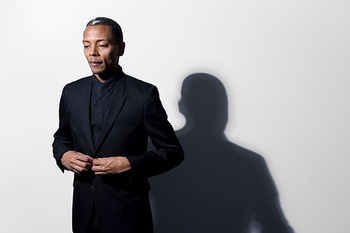During the UFA Film Nights at Bozar, silent film classics are being screened with new soundtracks. Techno pioneer Jeff Mills was asked to provide music for Berlin: Die Sinfonie der Großstadt. “Interesting things can happen when creative worlds mix.”
Jeff Mills has done ground-breaking work for techno music. Not only by giving us timeless classics like “The Bells” and “The March”, but also by popularising this music outside clubs and festivals. Classical orchestras perform his work, his beats and synths resound at dance productions, and he even modernises old 1920s films with new music, including Fritz Lang’s Metropolis, the Buster Keaton film Three Ages, and André Sauvage’s Études sur Paris.
For the UFA Film Nights at Bozar, Mills is coming up with a soundtrack for Walter Ruttmann’s classic Berlin: Die Sinfonie der Großstadt. It’s a city after his own heart. “I know Berlin very well. Having lived there for almost 15 years, working on the film felt the same way. There are small subtle things in the landscape in the film that I’ve seen thousands of times while walking through Berlin.”
The music you make has always had a futuristic character. I can imagine that for a lot of people it is a strange combination: images from the 1920s and outer-space music. How do you reconcile these two worlds?
Jeff Mills: From my observation of those eras of the 1920s and 30s, many achievements were being made in art, literature, cinema, contemporary dance, and many other art forms. These advancements might have been the result of how people imagined the world and the direction in which it was spinning. I tend to identify with that mind-set from where we are now in time. Fifteen years after the turn of the century and thanks to what technology has allowed us to discover, we feel that it’s a different time, but maybe there is more to do with actually seeing, hearing and feeling the difference.
How did you watch Berlin: Die Sinfonie der Großstadt the first time?
Mills: I was faintly aware of the film until I was presented with the invitation from Bozar. After watching and studying it, I began to see the documentary along with a bit of coordination as well. I think the director felt compelled to emphasise certain aspects of the city and mentality of Berliners at the time. It is a strategically edited film. Even in the way specific sequences were filmed, you can see the characters and perhaps the political positions that were around when it was filmed. We periodically see the poor and downtrodden in relation to the wealthy and privileged – workers always fighting against the clock and the rush of the city, where people sometimes fall victim to the pace and intensity.
Films made by Fritz Lang, Buster Keaton, and Walter Ruttmann are timeless. How do they capture society so well for you?
Mills: Each of those gentlemen was concerned about the world, people, and our condition. Each found impactful ways of bringing their views to their audiences. This remains one of the best usages of cinematic storytelling. Even with the recent film Straight Outta Compton, we understand by watching history being re-examined that we need not make those mistakes again. This is the common thread that ties most film directors together. Understanding this makes me more sensitive to subtle and significant shifts in our society and the world – to try and measure whether we’re moving in productive ways.
You have a big love for science fiction. What is your vision of the future of humanity?
Mills: There are many, but I’d like to consolidate those thoughts into saying that humanity has always moved forward, but with difficulty. Sometimes, encountering paralysing obstacles where people see no hope or reason to carry on. For some of us, these times are happening now, but they have to try and imagine that there will be better times ahead – that all of us are here because people in the past saw reasons and believed in solving serious problems for the betterment of humanity. The future is ours to design. We can either be plagued by the problems of the past or move on to new brighter, more promising paths.
You made an enormous effort to combine electronic music with other art forms. Opinions about electronic music have changed significantly throughout the years. If you look back to the period you started playing techno music, can you say what you did was visionary?
Mills: I can say that I felt it was necessary. Whether or not it was the right thing to do, I think time will tell. I know that interesting things can happen when creative worlds mix. I’ve always thought it could be well worth the effort to try.
In the DVD Exhibitionist (2006), you showed the craft of a DJ, how he works with records and a mixer. In part two, which was just released, you add live instrumentation. This shows not only that new technology gives us a lot of new possibilities, but also that the role of the DJ has changed to an all-round entertainer. Should DJs develop their skills more to avoid being replaced by computers?
Mills: I believe so. Of course this doesn’t apply to everyone who wants to be a DJ, but I think those who have the skill and tenacity to try and push the art form should do that. I think that we can gain a lot by having more choices on how we can use and program electronic music. I believe that the only way that a computer would fully replace a human is when a human decides that the human should be replaced. We program them. They do not program themselves.
Jeff Mills: Berlin: die sinfonie der großstadt
25/9, 20.00
UFA FILM NIGHTS
24 > 26/9, Bozar, www.bozar.be

Fijn dat je wil reageren. Wie reageert, gaat akkoord met onze huisregels. Hoe reageren via Disqus? Een woordje uitleg.